 W
WThe Academia de Genealogía y Heráldica Mota-Padilla was a cultural institution based in Guadalajara, Jalisco, the second largest city in Mexico. According with an article published in the Genealogical Journal (1971), this institution was the first genealogical association in Latin America.
 W
WThe Academia Mexicana de Genealogía y Heráldica is a cultural institution based in Mexico City, Mexico. It has a unique position in being an independent, privately funded institution led by eminent historians, enthusiasts in the Genealogical and Heraldic Sciences whose purpose is to promote the creation, enjoyment and appreciation of the after mentioned sciences through research, essays, colloquiums, courses, exhibitions, education and debate.
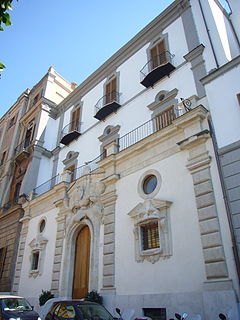 W
WThe Bibliotheca Hertziana – Max Planck Institute for Art History is a German research institute located in Rome, Italy. It was founded by a donation of Henriette Hertz in 1912 as a Kaiser Wilhelm Institute. Of the 80 institutes in the Max Planck Society, it is one of the few not located in Germany. The institute is situated in the historical centre of Rome near Trinità dei Monti in a cluster of four buildings along the Via Gregoriana: the 16th-century Palazzo Zuccari, the adjacent Palazzo Stroganoff, the Villino Stroganoff across the road and the new library building designed by the Spanish architect Juan Navarro Baldeweg.
 W
WThe Center of Studies of Ancient Near Eastern History is a university-based research institution of the Pontifical Catholic University of Argentina, Buenos Aires, Argentina, focused on the history and archaeology of the Ancient Near East. The CEHAO has many periodical publications. The center's flagship is Antiguo Oriente, an annual peer-reviewed journal. CEHAO also publishes, jointly with the Society of Biblical Literature, the open-access peer-reviewed Ancient Near East Monographs (ANEM). Finally, Damqatum, an annual journal aimed at the general public with publications of preliminary high-impact research results.
 W
WThe Center for Urban History of East Central Europe is an independent research center, that was founded by the Austrian historian Harald Binder in 2004 as a private non-profit organization. It is one of the principal academic establishments looking at the urban history of East Central Europe, the region between the German-speaking countries and Russia. The academic principal of the center is Sofia Dyak.
 W
WThe Centre for Historical Research and Documentation on War and Contemporary Society, known by its combined French—Dutch acronym Cegesoma or CegeSoma, is a historical research institute and archive based in Anderlecht, Brussels in Belgium. It focusses on World War II and the contemporary history of Belgium. Since 2016 it has formed part of the Belgian State Archives. Its director is Nico Wouters.
 W
WThe Colombian Institute of Anthropology and History, ICANH, is a scientific and technical government agency ascribed to the Ministry of Culture in charge of researching, producing and disseminating knowledge in the fields of anthropology, archeology and colonial history to protect the archaeological and ethnographic patrimony of Colombia.
 W
WThe Department of Archaeology at the University of York, England, is a department which provides undergraduate and postgraduate courses in archaeology and its sub-disciplines and conducts associated research. It was founded in 1978 and has grown from a small department based at Micklegate House to more than a hundred undergraduate students based at King's Manor and with scientific facilities at the BioArCh centre on the main campus.
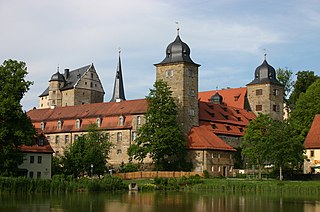 W
WThe Forschungsinstitut für Musiktheater (FIMT) is a research institute for the study of opera and musical theatre. It is located in the Thurnau Castle, Thurnau, near Bayreuth, Bavaria.
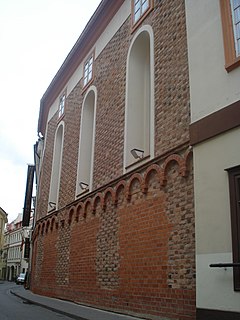 W
WThe Genocide and Resistance Research Centre of Lithuania is a state-funded research institute in Lithuania dedicated to "the study of genocide, crimes against humanity, and war crimes in Lithuania; the study of the persecution of local residents by occupying regimes; the study of armed and unarmed resistance to occupying regimes; the initiation of the legal evaluation of the activities of the organisers and implementers of genocide; and the commemoration of freedom fighters and genocide victims." The centre was founded on 25 October 1992 by the Supreme Council of the Lithuanian Republic as the "State Genocide Research Centre of Lithuania". It is a member organisation of the Platform of European Memory and Conscience.
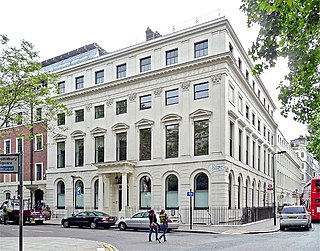 W
WThe German Historical Institute London (GHIL) is one of the nine independent academic research institutes of the German Historical Institute that are part of the Max Weber Foundation.
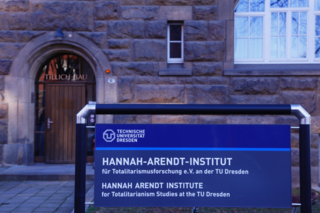 W
WThe Hannah Arendt Institute for Research on Totalitarianism is a German research institute affiliated with the Dresden University of Technology, devoted to research on totalitarianism and comparative studies of dictatorships, particularly communism and fascism/nazism and comparative analyses. Named in honour of Hannah Arendt, the author of The Origins of Totalitarianism, the institute was founded by a decision of the Landtag of Saxony shortly after the fall of communism and opened in 1993. In its first two decades of existence, the main focus has been on the former East Germany and post-communist studies; since the 2010s the institute has also strengthened its research on the Nazi era. Since 2017, Thomas Lindenberger is the institute's director.
 W
WThe Institute of Contemporary History in Munich was conceived in 1947 under the name Deutsches Institut für Geschichte der nationalsozialistischen Zeit. Founded by the German government and the State of Bavaria at the suggestion of the Allied Forces, it was established in 1949 and renamed in 1952. Its purpose is the analysis of contemporary German history.
 W
WThe Institute of Social Sciences Research is an excellence research center of the Pontifical Catholic University of Argentina and Associated Unit of the CONICET located in Buenos Aires, Argentina, dedicated to research in the field of the social sciences and the humanities.
 W
WThe Jewish Historical Institute, also known as the Emanuel Ringelblum Jewish Historical Institute, is a research foundation in Warsaw, Poland, chiefly dealing with the history of Jews in Poland and Jewish culture.
 W
WKamarupa Anusandhan Samiti is a research society established in 1912 by scholars and researchers to shed light on the history, civilization and culture of ancient Assam.
 W
WThe Max Planck Institute for the History of Science is a scientific research institute founded in March 1994. It is dedicated to addressing fundamental questions of the history of knowledge from the Neolithic era to the present day, and its researchers pursue a historical epistemology in their study of how new categories of thought, proof, and experience have emerged in interactions between the sciences and their ambient cultures.
 W
WThe Omohundro Institute of Early American History and Culture (OI) is the oldest organization in the United States exclusively dedicated to advancing the study, research, and publication of scholarship bearing on the history and culture of early America, broadly construed, from circa 1450 to 1820. Their scope of inquiry includes North America and related histories of the Caribbean, Latin America, Europe, and Africa. Since 1943 the Institute has published the William and Mary Quarterly and books, and sponsored conferences and fellowships.
 W
WThe Pontifical Catholic University of Valparaíso History Institute is a Chilean academic unit which is part of the Pontifical Catholic University of Valparaíso's Philosophy and Education Faculty.
 W
WThe Princeton University Department of History is an academic department at Princeton University in Princeton, New Jersey. Founded in 1871, the department is one of the leading programs in the country for the study of history. It teaches, offers coursework at the undergraduate and graduate levels, and in research, organizes numerous research initiatives and public events. The department is home to approximately 60 faculty members, many of whom teach courses in other departments as well.